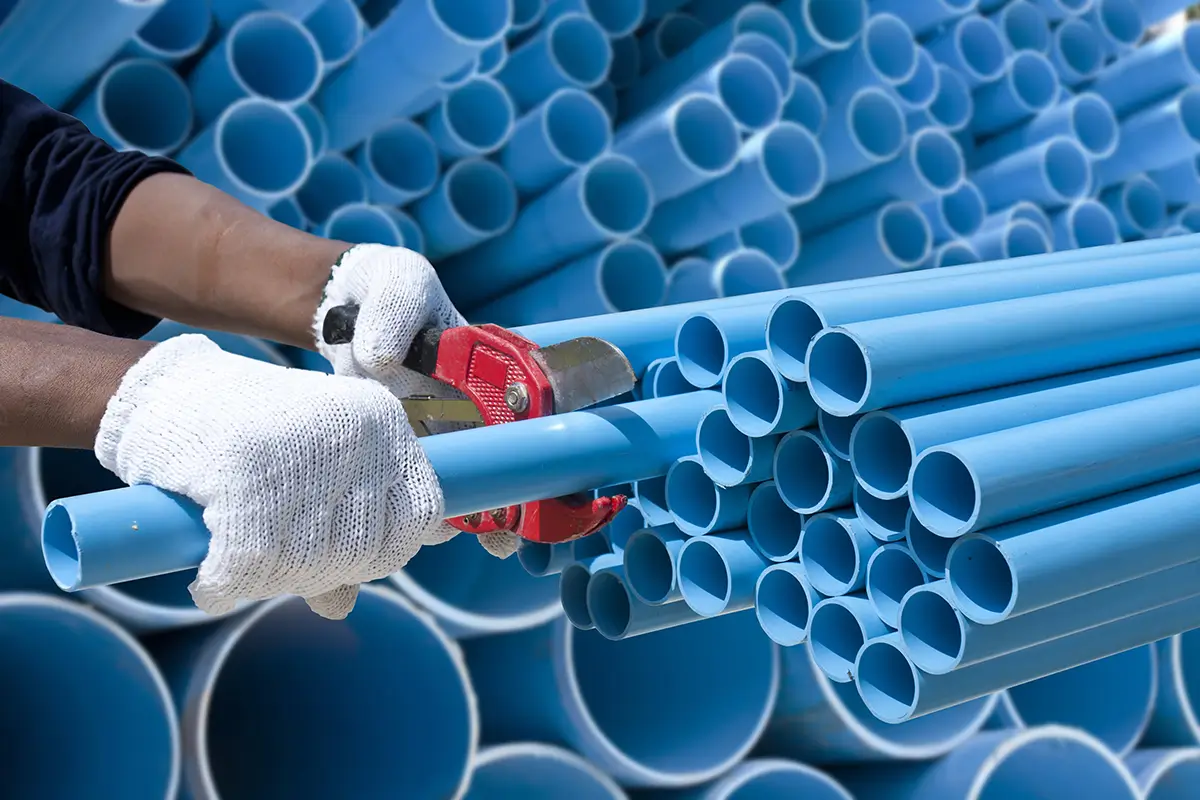When it comes to plumbing, the pipes are the lifelines of your home. Choosing the right pipe material can make all the difference in terms of durability, efficiency, and cost. At Bassett Services, we believe that informed homeowners are empowered homeowners. That’s why we’re here to guide you through the various types of pipe materials available for your plumbing needs. Whether you’re building a new home or renovating an existing one, understanding your options will help you make the best choice for your family.

The Importance of Choosing the Right Pipe Material
When it comes to your home’s plumbing, choosing the right pipe material is like picking the right friend to count on. Just as you’d want a loyal and sturdy companion by your side, you want a plumbing system that provides reliable service day in and day out. The materials you choose for your pipes will influence not just water quality and installation costs, but also the longevity and efficiency of your plumbing system.
At Bassett Services, we’re dedicated to guiding you through this important decision. Our team of experienced professionals is here to help you understand your options, ensuring that your plumbing choices fit your needs and budget. Let’s explore the most common pipe materials, their pros and cons, and how we can support you in making the best choice for your home.
1. Copper Pipes
Overview
Copper has been a popular choice for plumbing for decades, and for good reason. These pipes are made from a malleable and corrosion-resistant metal that provides excellent durability.
Pros
- Longevity: Copper pipes can last for 50 years or more with proper care.
- Resistant to Corrosion: They can withstand high temperatures and do not rust.
- Bacterial Resistance: Copper has natural antimicrobial properties, helping to keep your drinking water clean.
Cons
- Cost: Copper is often more expensive than other materials.
- Installation: It requires professional installation due to the need for soldering, which can increase labor costs.
- Thermal Conductivity: Copper can conduct heat, leading to potential energy loss.
2. PVC (Polyvinyl Chloride) Pipes
Overview
PVC pipes are a popular choice for drainage, waste, and vent systems. They’re made from a type of plastic and are lightweight, making them easy to handle and install.
Pros
- Cost-Effective: PVC is typically less expensive than copper or other metal pipes.
- Lightweight: Easy to transport and install, which can reduce labor costs.
- Resistant to Corrosion: PVC does not rust or corrode, making it ideal for moisture-rich environments.
Cons
- Temperature Limitations: PVC can warp or melt if exposed to high temperatures.
- Brittleness: While PVC is strong, it can become brittle over time, especially if exposed to UV light.
- Not for Hot Water: PVC is not recommended for hot water lines.
3. CPVC (Chlorinated Polyvinyl Chloride) Pipes
Overview
Similar to PVC, CPVC pipes are treated to withstand higher temperatures, making them suitable for hot water lines.
Pros
- Higher Temperature Resistance: CPVC can handle temperatures up to 200°F.
- Corrosion Resistant: Like PVC, CPVC doesn’t rust or corrode.
- Cost-Effective: Generally, CPVC pipes are affordable and easy to install.
Cons
- Brittleness: Similar to PVC, CPVC can become brittle over time, particularly in cold temperatures.
- Chemical Sensitivity: CPVC may be more sensitive to certain chemicals compared to other materials.
4. PEX (Cross-Linked Polyethylene) Pipes
Overview
PEX has become increasingly popular in recent years due to its flexibility and ease of installation. It’s a type of plastic pipe that is resistant to temperature changes.
Pros
- Flexibility: PEX can bend around corners, reducing the need for fittings and making installation easier.
- Resistant to Freezing: PEX can expand if water freezes inside, making it less likely to burst.
- Low Heat Loss: Insulation reduces heat loss, making it energy-efficient.
Cons
- UV Sensitivity: PEX can degrade when exposed to sunlight, so it must be kept indoors.
- Limited Lifespan: While PEX is durable, it generally has a shorter lifespan compared to copper.
- Fittings Needed: Requires specific fittings for connections, which can add to installation costs.
5. Galvanized Steel Pipes
Overview
Once a common choice for plumbing, galvanized steel pipes are coated with zinc to resist corrosion. However, they’ve largely fallen out of favor.
Pros
- Durability: Galvanized pipes are sturdy and resistant to damage.
- Resistant to Corrosion: The zinc coating provides some protection against rust.
Cons
- Rust Over Time: The zinc coating can wear away, leading to rust and water quality issues.
- Heavy and Difficult to Work With: Installation can be labor-intensive due to their weight.
- Shorter Lifespan: Generally lasts around 20-50 years, depending on conditions.
6. Cast Iron Pipes
Overview
Cast iron pipes have been used for plumbing for centuries. Known for their strength and durability, they are often found in older homes.
Pros
- Longevity: Cast iron pipes can last over 100 years if maintained properly.
- Noise Reduction: They absorb sound better than plastic pipes, making them ideal for drainage systems.
Cons
- Weight: Very heavy, making installation labor-intensive and costly.
- Corrosion Risk: Over time, cast iron can rust, leading to leaks and other issues.
- Cost: Generally more expensive to install and maintain.
7. Stainless Steel Pipes
Overview
Stainless steel pipes are less common in residential plumbing but are often used for specific applications, such as gas lines or in areas that require high corrosion resistance.
Pros
- Corrosion Resistant: Stainless steel is highly resistant to rust and corrosion.
- Durability: These pipes are strong and can handle high pressure.
- Longevity: Stainless steel pipes can last for many years, often outlasting other materials.
Cons
- Cost: Stainless steel is one of the more expensive options.
- Weight: Heavy and may require additional support for installation.
Making the Right Choice for Your Home
At Bassett Services, we understand that choosing the right pipe material can be a daunting task. Our experienced technicians are here to help you navigate your options and determine the best fit for your home’s plumbing system. Here are a few tips to consider when making your decision:
- Assess Your Needs: Consider the specific requirements of your plumbing system. Are you replacing old pipes, or are you starting from scratch? Will you need pipes for hot water, cold water, or drainage?
- Consider Your Budget: Each pipe material has different costs associated with it, including material and installation. Make sure to factor in both short-term and long-term costs.
- Climate Considerations: Your local climate can affect the performance of certain pipe materials. For example, if you live in an area prone to freezing temperatures, PEX might be a smart choice.
- Consult the Experts: Whether it’s inside or outside, Bassett is always by your side. Our team is ready to provide you with tailored advice and professional installation services.
Call Bassett Services for Expert Plumbing Pipe Service
At Bassett Services, we’ve built our reputation on delivering trustworthy, high-quality home services since 1978. Just like a loyal basset hound, we’re doggedly determined to provide you with the best plumbing solutions for your home. Our commitment to upfront pricing and a 100% satisfaction guarantee means you can trust us to get the job done right.
Understanding different types of pipe materials is essential for any homeowner looking to maintain or upgrade their plumbing system. From copper and PVC to PEX and cast iron, each material comes with its own set of advantages and disadvantages. By working with Bassett Services, you can ensure that you choose the right pipes for your needs, backed by the expertise of our professional team.
So, whether you’re embarking on a new construction project or simply looking to replace aging pipes, sound the hound! Contact Bassett Services today for expert plumbing solutions that are just a bark away. Your home’s best friend is here to help!





